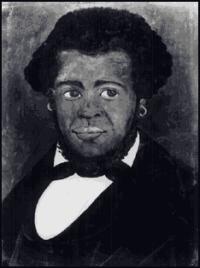
Captain Absalom Boston
Over nearly three centuries of whaling, some 175,000 men went to sea in 2,700 ships. Of the 2,500 masters who captained these ships, at least 52 were men of color. In honor of Black History Month, here is an updated repost about Absalom Boston, captain of the whaleship Industry, which sailed in 1822 with an all-black crew.
Absalom Boston was born in Nantucket in 1785 to Seneca Boston, an African-American ex-slave, and Thankful Micah, a Wampanoag Indian woman. Absalom Boston’s uncle was a slave named Prince Boston, who sailed on a whaling voyage in 1770. At the end of the voyage in 1773, Prince Boston’s white master, William Swain, a prominent Nantucket merchant, demanded that he turn over his earnings. Boston refused. He took Swain to court and with the support of prominent whaleship owner William Rotch, won his earnings and his freedom, becoming the first slave to be set free by a jury verdict. The impact of the lawsuit effectively ended slavery on Nantucket.
Absalom Boston went to sea in whaleships while still in his teens. By the age of twenty he had earned enough to purchase property on Nantucket and ten years later obtained a license to open and operate a public inn. In 1822, Boston became captain of the schooner Industry and embarked on a six-month whaling voyage, with an all-black crew, returning with all hands and seventy barrels of oil.
Captain Boston came ashore after a single voyage on the Industry to run a store and inn. He helped establish a school and a church and ran for public office. He became of the leaders of the abolitionist movement on the island. In 1845, he successfully brought suit against the town to get his daughter Phebe Ann Boston admitted to the Nantucket public high school. When he died in 1855, Captain Boston was wealthy, with three homes, a store, and considerable landholdings.
